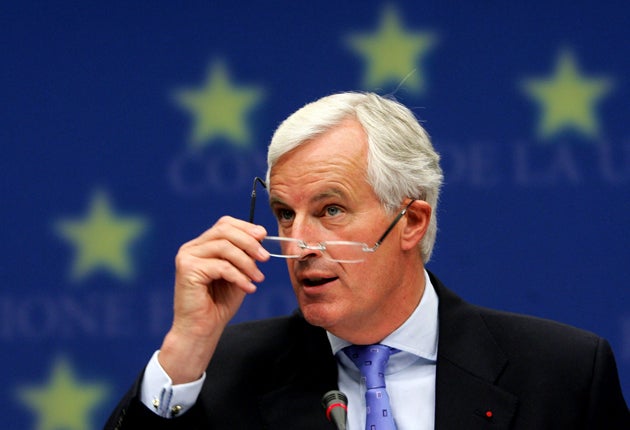Michel Barnier: Who is the new EU Brexit negotiator labelled 'no friend of the City'?
Former Lib Dem leader Nick Clegg says Michel Barnier – dubbed 'le cretin des Alpes' by French critics – is likely to 'drive a very hard bargain indeed'

When Michel Barnier visited Britain during his spell as a European Commissioner, he would say with a smile that he was an Anglophile and most definitely not “the most dangerous man in Europe” as our Eurosceptic tabloids labelled him.
The former French foreign minister’s brief as Internal Market Commissioner covered the City of London, which led to a series of clashes with George Osborne, who tried to defend Britain’s financial services industry from a blizzard of EU regulation introduced by Mr Barnier.
So the Treasury and the City will be worried to discover that they have not seen the back of the 65-year-old Mr Barnier, whose term in Brussels ended in 2014.
He has been unexpectedly recalled to be the commission’s chief negotiator in talks with the UK over its exit from the EU. The future of the City will be a critical issue when access to the single market is discussed.
“He is no friend of the City of London,” said Nick Clegg, the former Deputy Prime Minister and commission official, who knows Mr Barnier.
“I think he is going to drive a very hard bargain indeed. I wouldn’t be surprised if alarm bells are ringing across the City.”
Mr Barnier’s appointment as head of the commission’s taskforce on Brexit looks like a provocative act by Jean Claude-Juncker, the commission president.
Mr Juncker, who wanted Theresa May to start formal exit negotiations immediately, has reluctantly agreed that she needs more time to prepare – a recognition that Brussels could not force the UK to trigger Article 50 of the EU’s Lisbon Treaty.
Once the process has started – probably early next year – the EU, rather than the UK, will be in the driving seat.
Ms May, who is on a charm offensive with other EU leaders as she tours European capitals, will try to cut deals with them, but the commission – and Mr Barnier – will have a pivotal role when the fine print is negotiated.
Mr Barnier is also no friend of the Tory Eurosceptics, who he will probably assume now call the shots inside the British Government.
In 2013 on a visit to London, he accused them of having a “pick and mix” approach towards EU financial rules. He issued a warning which now sounds ominous: “Repatriating powers [from Brussels to the UK] over financial services would mean leaving the single market and de facto the EU. I believe the UK would lose out on many of its own interests."
In his previous role in Brussels, he introduced more than 40 laws to toughen the regulation of banks, markets and insurance.
No fan of “Anglo-Saxon capitalism”, his plans to cap bankers’ bonuses led to a major dispute with the then-Chancellor George Osborne. But there was a reason for his interventionist approach: he believed the 2008 financial crisis was made in Wall Street and was determined that London and the rest of Europe would not repeat the same mistakes.
A centre-right politician, Mr Barnier had hoped to land the commission’s top job in 2014 but was beaten to the European People’s Party nomination by Mr Juncker, the former Luxembourg Prime Minister.
Mr Barnier has a vast network of contacts throughout Europe, after serving as France’s agriculture minister and foreign affairs minister.
In France he was seen as a technocrat with a populist touch and an eye for a TV camera, rather than an intellectual. He was sometimes a victim of snobbery from France’s elite because he was not educated at the prestigious École Nationale d'Administration.
He was cruelly dubbed "le crétin des alpes" -- a dig at his origin in the mountains of Savoy that references the Alpine valley dwellers who suffered brain damage caused by iodine deficiency in the 18th century.
Mr Barnier served two terms at the commission, holding the regional affairs brief before moving up to the plum internal market job. He is a former member of the European Parliament, where his former colleagues will lobby him not to give Britain any special favours. He is unlikely to need such encouragement.
However, Mr Barnier may prove not to be the ogre depicted by the tabloids. He worked hard at winning over the City and frequently pressed the flesh in London rather than rained down directives from the safety of his Brussels base.
He won some plaudits after the initial hostility to his stream of regulations, and his relationship with Mr Osborne improved too.
“My line has been the middle line,” he told the Financial Times. “My first wish was to build a compromise. It was never easy, it was sometimes impossible. For the rest we reached agreement and it was never by chance.”
Syed Kamall, leader of the Conservative MEPs, described Mr Barnier as “first and foremost a very pragmatic politician, a dealmaker”.
And there will be an awful lot of deals to be done over the next two and a half years.
Join our commenting forum
Join thought-provoking conversations, follow other Independent readers and see their replies
Comments